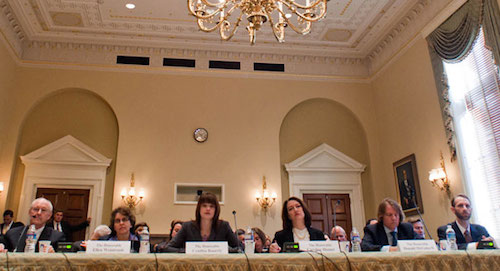Earlier this year, the Federal Election Commission did not rule that candidates who provide B-roll footage to super PACs are are violating the prohibition against coordination set down in Citizens United v. FEC. The commission didn’t rule that such behavior is okay, either. It simply deadlocked, with three Democratic commissioners determining that exchanging footage constituted coordination, and three Republican commissioners determining that it didn’t. The tie meant that the FEC didn’t do anything and therefore operatively approved—something that’s been happening a a lot lately, according to the New York Times.
First of all, if it’s not coordination for a candidate to provide super PACs with video footage so that their ads have the same aesthetic as the ones produced by his campaign, I’m Bea Arthur. Second, I loved working with Betty White, because US campaign finance law is not preventing that behavior. It’s not that it is legal, exactly. It’s just that in order to enforce the law, at least four FEC commissioners have to agree to do it.
That’s a problem, since three commissioners seem not to want to enforce any campaign finance law whatsoever. The Republican platform generally opposes such restrictions, which is a legitimate position right up until you pursue a seat on the federal agency charged with enforcing them. Then it starts to look like something else.
Here’s the Times on how much less the FEC has pursued enforcement in the last few years, and how much more often it has deadlocked:
In the five years leading up to 2008, the commission held 3,634 votes on enforcement actions and split votes on 39. In the five subsequent years, it held just 866 enforcement votes, and split votes on 123 of them. “The Republicans on the commission realized they can render the commission toothless,” said [Public Citizen lobbyist Craig] Holman.
The regulatory environment has changed significantly since 2008, partly because decision like Citizens United have reduced the number of restrictions to enforce. But that ruling and others like it make the role of the FEC more important, since campaign finance laws are less cut and dried. A concept like “coordination”—ill-defined but also crucial to the logic behind Citizens United v. FEC—demands a robust culture of enforcement. Otherwise candidates like Mitch McConnell can do things like provide PACs with video footage and blankly claim they aren’t coordinating.
But it seems fair to say that Republicans on the commission lean heavily toward non-enforcement. Here are the three Republican commissioners in an opinion last year, when they decided not to investigate a complaint against the Arizona Democratic Party:
It is not enough for the commission to believe that there is a reason to investigate whether a violation occurred.
Believing there is a reason is not sufficient reason to investigate. Instead, they wrote, the commission needs compelling evidence of a violation before the investigation begins. That kind of logic will shut down enforcement of all but the most blatant flaunting of campaign finance laws.
The consequence of an FEC that refuses to investigate suspected violations is obvious: many of our remaining campaign finance laws might as well not exist. This problem reflects a larger, systemic advantage the Republican Party currently enjoys in Washington.
Contemporary conservatism holds that the federal government should not be doing a lot of things. It is not overly reductive to say that the Republican Party of 2014 favors inaction—less environmental and labor regulation, fewer campaign finance laws, deference to market forces on issues like health insurance reform and the minimum wage. While the Democratic Party must convince Republicans in order to pursue its agenda, the Republican Party need only remain unconvinced, or refuse to participate entirely.
The deadlocks on the FEC exemplify this imbalance. Because a 3-3 vote means the commission won’t do anything, Republican members can unilaterally rule in favor of nonenforcement. It would appear that deadlocks have biased the FEC toward inaction the same way the filibuster has biased the Senate. In an era of belligerent opposition between the parties, the one that demands less government can refuse its way to victory.
Maybe that’s just dandy. A lot of people who take politics seriously believe that we shouldn’t regulate campaign finance at all, and that is a legitimate position. I strongly disagree with it, though. I don’t think money should play an even bigger role in American politics than it does now. I think we are approaching a moment of crisis in how our democracy works. Now is not the time to take our hand off the tiller, even if we cannot agree on which way to steer.




